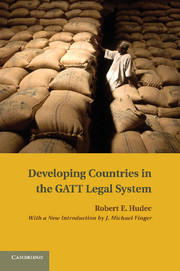Book contents
- Frontmatter
- Contents
- Foreword by Hugh Corbet
- Acknowledgments
- DEVELOPING COUNTRIES IN THE GATT LEGAL SYSTEM
- Introduction to the New Edition
- PART I A HISTORY OF THE LEGAL RELATIONSHIP
- 1 Post-war Negotiations on Trade Liberalization
- 2 First Decade of the GATT – 1948–1957
- 3 Demands for a New Legal Relationship – 1958–1963
- 4 Defining the New Relationship – 1964–1971
- 5 Testing the New Relationship – 1972–1979
- 6 Developments in the 1980s – Form without Substance
- PART II A LEGAL CRITIQUE OF THE GATT'S CURRENT POLICY
- List of References
- Index
3 - Demands for a New Legal Relationship – 1958–1963
Published online by Cambridge University Press: 03 May 2011
- Frontmatter
- Contents
- Foreword by Hugh Corbet
- Acknowledgments
- DEVELOPING COUNTRIES IN THE GATT LEGAL SYSTEM
- Introduction to the New Edition
- PART I A HISTORY OF THE LEGAL RELATIONSHIP
- 1 Post-war Negotiations on Trade Liberalization
- 2 First Decade of the GATT – 1948–1957
- 3 Demands for a New Legal Relationship – 1958–1963
- 4 Defining the New Relationship – 1964–1971
- 5 Testing the New Relationship – 1972–1979
- 6 Developments in the 1980s – Form without Substance
- PART II A LEGAL CRITIQUE OF THE GATT'S CURRENT POLICY
- List of References
- Index
Summary
IN THE YEARS following the 1954 Review Session, the question of the GATT's relationship to developing countries continued to grow in importance. According to Karin Kock, the Swedish expert on GATT affairs, the issue became critical once it became clear that a large number of British and French colonies were soon to achieve independence. “Cold War” competition for the loyalty of these emerging countries intensified when the Soviet Union began to press for the creation of a global trade organization, within the United Nations, that would provide an alternative to the Western-dominated GATT. The prospect of a rival United Nations organization grew more substantial each year and finally materialized in the form of the United Nations Conference on Trade and Development (UNCTAD), formally constituted in 1964.
CHANGES IN BARGAINING POWER
By the early 1960s, GATT relations between developed and developing countries had become almost totally centered on competition with UNCTAD in the making. The UNCTAD threat considerably augmented the bargaining power of developing countries. Developed countries believed that a bloc decision not to participate in the GATT would be seriously damaging to Western political interests; they were therefore willing to pay a price to avoid it. Developing countries knew this and asked for a great deal. In the end, however, the UNCTAD threat had its limits. Developing countries knew that the GATT was useful to them and they knew that a United Nations type organization might not be able to replace it.
- Type
- Chapter
- Information
- Developing Countries in the GATT Legal System , pp. 51 - 63Publisher: Cambridge University PressPrint publication year: 2010

